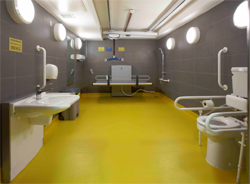Changing Places to provide equality
Disabled toilet solutions company Clos-o-Mat is backing a move by Changing Places campaigners to remind architects and designers that they could be exposing their clients to risk of breaking the law if they do not include a specific type of accessible toilet in new build or refurbishment projects.

Under the Equality Act, which replaced the Disability Discrimination Act, service providers (including shops, tourist attractions and restaurants) are required to make reasonable changes – including to the built environment – where a disabled customer or potential customer would otherwise be at a substantial disadvantage. The Government’s own easy reference guide further states: “You should not wait until a disabled person experiences difficulties using a service.”
For hundreds of thousands of the UK’s 11million registered disabled, those who need a carer to help with personal care, conventional wheelchair-accessible toilets are unsuitable. “That means either having to lie on a toilet floor, often with the door open so anyone else can see you, or to go home, or not go out at all,” says Margaret Clough. “That puts my family, with my daughter Julie, at a substantial disadvantage, to use the Government’s terminology, as Julie is a severely disabled adult, in a wheelchair. Surely making one toilet bigger, and including a couple more pieces of equipment, is a reasonable change?”
Margaret, her family and other similar families are petitioning venues as diverse as motorway services, hospitals, and tourist attractions to install Changing Places toilets. With more space than current wheelchair-accessible toilets, these also include as standard a hoist, adult-sized height adjustable changing table, and privacy screen.
“You wouldn’t today expect to have to change a baby on the toilet floor, so why a child or adult?” asks Margaret. “There are over 8000 public toilets in the UK, excluding ones we use in cafes, bars, at hospitals, tourist attractions. Yet there are fewer than 800 Changing Places toilets. There are at least 1.5million wheelchair users in the UK. One in 10 people suffers from bladder or bowel incontinence: There is clearly a need, and we would maintain that adding these toilets on top of existing accessible facilities is a reasonable alteration.
“Beyond the moral obligation, it has financial benefits too: 20% of the average business’s customer base is disabled. Disabled people spend some £80billion a year! Research shows people choose NOT to use somewhere they believe does not have suitable toilets.”
To help architects and facilities managers get their accessible toilets right, and meet Changing Places campaigners needs, leading disabled toilet solutions company Clos-o-Mat has developed the most comprehensive and a unique ‘one-stop shop’ solution.
In-house, the company can provide design advice, then supply all the equipment, if necessary install and commission it, and subsequently service & maintain it. Full project management can also be provided. This is reinforced with support services including CAD blocks, and sector-specific advisory white papers available for free on its website http://www.clos-o-mat.com
Ends
Article supplied by AFPR on behalf of:
Clos-o-Mat
Tel: 0161 969 1199
Email: info@clos-o-mat.com
